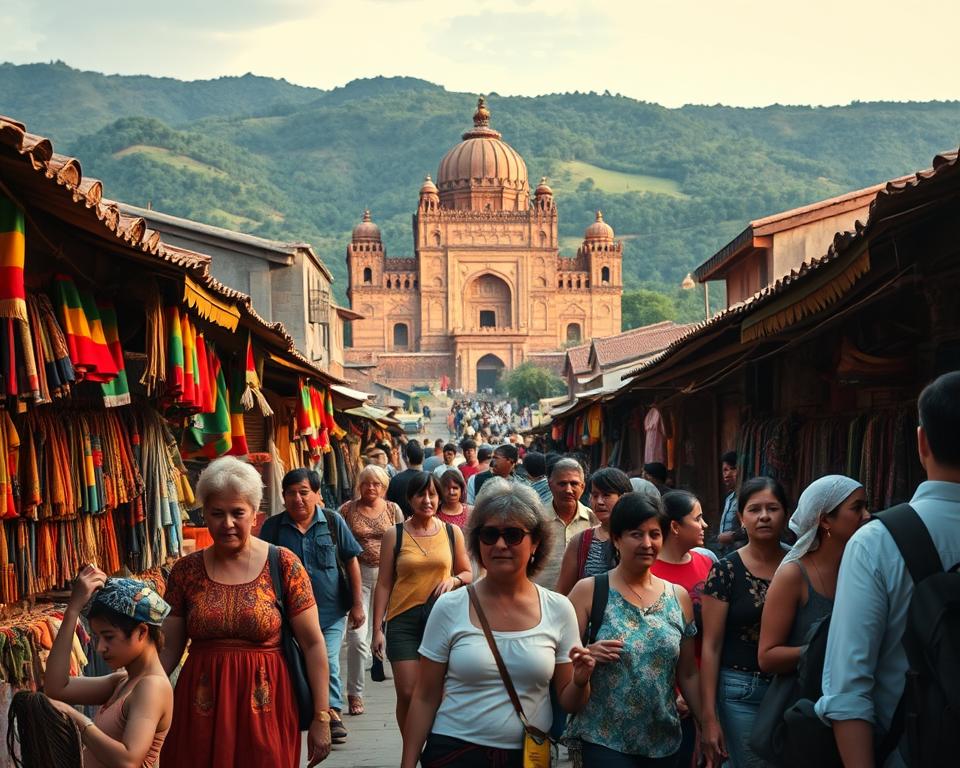Advertisements
sources study travel It will help you filter useful and up-to-date information to learn better and make informed decisions. How can you distinguish what's essential in a sea of opinions and offers?
He tourism It's a dynamic industry that combines hotel management, marketing, technology, and destination design. That's why you need variety: OTAs like Booking.com, Expedia, Airbnb, Agoda, and TripAdvisor are showing signs of success, but they're not the only reference point.
Complete this data with academic studies, sector reports and communities in the worldComparing sources allows you to understand seasonality, demand, and regulatory changes before planning practices or projects.
Your chance It grows when you combine reading and practice: volunteering, short projects, or internships provide experience and develop skills. Check for relevance, traceability, and biases; respect local norms and the cultures you visit.
This article will guide you through academic sources, industry, culture, sustainability, data, and employment, as well as curated lists for comparison. Keep an open mind and focus on practicality.
Introduction: Why travel study sources define your learning and decisions
Knowing how to choose where to read changes what you learn about tourism and how you apply that knowledge in practice. If you're pursuing careers or vocational training, the quality of the information influences your level of expectations and the skills you develop.
Before deciding, compare theory, market data, and the experiences of people already working in the sector. Talking to students and graduates helps you avoid surprises about the quality of teaching and available internships.
What is meant by “sources”
Sources They are everything that gives you actionable knowledge: career plans and frameworks, academic articles, industry reports, open data, professional communities, and personal experiences.
How to evaluate reliability
- Date: prioritizes recent content.
- Authorship: identifies who signs and their connection to the industry.
- Methodology: look for clear methods and links to original data.
- Biases: detects promotions or self-praise and seeks independent analysis.
- Context: compare with other evidence from the environment and the professional world.
“Compare individual experiences with aggregate data to avoid jumping to conclusions.”
Quick checklist: Is it current? Can I trace the source? Do I understand the context? What biases exist? What needs to be checked?
Formal academic sources: universities, programs and curricula
Not all the racing that cover tourism offer the same practical training. Check the program's focus before deciding.
Routes Common: Bachelor's Degree in Logistics, Airline Services Technician, Maritime Business Administration, Hotel Management and Tour Guide.
Current areas and specializations
Hotel management, tourism marketing, event planning, tourism technology, and destination design are all directly applicable specializations.
How to compare programs
- Academic focus: theory vs. skills.
- Teachers: professional experience and publications.
- Conventions and practices: Programs like the Disney International College Program provide international experience.
- Admission process: transparency in requirements and testing.
Real-life examples: Social Communication for promotion; Foreign Languages and Applied English for bilingual roles; International Relations and Cultural Anthropology for context analysis.
“Review curriculum, internship hours, and employability statistics before applying.”
The languages, especially the language English expands your operational and content profile. Request access to labs or simulators and project examples to evaluate growth opportunities.
Industry Sources: Where to Track Trends, Tools, and Opportunities
Observing how the industry communicates helps you anticipate new routes, models, and staffing needs. Follow company portals and aggregators to get quick market signals.
OTAs and aggregators Sites like Booking.com, Expedia, Airbnb, Agoda, and TripAdvisor serve as a thermometer. Look at rates, occupancy, and reviews to detect seasonal peaks and changes in demand, but don't take them as the only truth.
Airlines, cruises and hotel chains
Subscribe to newsrooms and quarterly reports. Airlines and chains publish traffic, new routes, and results that anticipate bookings and destination openings.
Agencies and operators
Read professional blogs, cases, and service policies to understand real standards of care. people travelers.
- Monitor job boards and fairs to map hiring cycles.
- Follow local chambers and associations to understand regulation by countries.
- Compare internships: Programs like the Disney International College Program offer international experience.
“Compare commercial communications with independent reports and public data.”
For technical depth, check out technologies and trends at this link: technology and industry trends.
Culture, sustainability and travel ethics: sources that broaden perspective
To understand the real impact of tourism, you need to look beyond the numbers: observe how people live on the ground. Responsible training combines theory, practical cases, and accessible metrics.

Responsible tourism education: practices and impact metrics
In your career Learn to measure impact. Use simple waste, water, and energy indicators to evaluate hotels and activities.
Review case studies at destinations sensitive and apply good practices: capacity limits, codes of conduct and schedules that protect local life.
- Apply basic measurements: consumption per guest, waste generation and water use.
- Document learnings with quarterly metrics to improve processes.
- Consult local guides and association manuals for responsible criteria.
Cultural anthropology and heritage: why understanding contexts changes decisions
Authors such as Margaret Mead and Clifford Geertz show how interpreting customs improves events that are respectful of the host country's heritage.
Develops skills such as intercultural empathy and clear communication. This improves experiences and protects the environment and community life.
“Understanding the culture of a place is the first step to not damaging it.”
Before operating, evaluate local regulations and certifications. Prioritize academic sources, responsible destination guides, and association manuals for designing ethical projects.
Data by destination and labor market: how to read opportunities without creating false expectations
Interpreting data by destination helps you find chance Real, not idealized. Look at seasonality, average fares, occupancy, and route openings before assuming a location will be stable.
Mexico as a case study: economic weight and diversity
In Mexico the tourism It supports employment in resorts, boutiques, glamping, and house rentals. Destinations like Cancún, Mexico City, Oaxaca, and Mérida show different signs: some are seasonal; others have more constant demand.
Employment and work reality: schedules, competition and growth
The reality of work often includes long hours and weekend work. Customer service remains the key differentiator for rising in the industry. level within a company.
- Reference data: Average salary 2022 for a Bachelor of Tourism ≈ $7,505 MXN/month (varies by region and role).
- Combine studies and early experience. Look for internships with rotations and structured training.
- Evaluate the around Organizational: pay, overtime, and leadership. Document achievements to aspire to greater growth.
“Compare offers with testimonials from students and graduates before making a decision.”
Skills and languages: sources for developing key competencies
Improve your profile Combines daily practice and concrete resources. Prioritize active learning and apply what you learn in real-life situations.
Priority languages and resources
Prioritize professional English and adds other languages according to countries and segments (aviation, hotels, cruises, MICE).
Practical resources: specialized MOOC courses, language exchange platforms, and certifications focused on customer service in English.
Cross-curricular skills for work
Train in clear communication, stress management, and hospitality skills using check-in simulators, basic revenue modules, and incident resolution courses.
- Role-play with peers or mentors to improve guest service.
- International internships (e.g., programs like the Disney International College Program) to improve your skills and network.
- Create a portfolio with projects, KPIs, and reviews as evidence of your experiences.
“Soft skills increase your employability as much as technical knowledge.”
Final tip: Study in short chunks, document achievements, and look for opportunities that allow you to practice languages in real-life contexts. This will enhance your career and your professional life in the tourism industry.
Travel Study Sources: Curated Lists and Ways to Cross-Reference Information
A board with sources key helps you filter out noise and see useful signals in the industry.
Make a list with: catalogs of universities, OTAs (Booking.com, Expedia, Airbnb, Agoda, TripAdvisor), chain and airline reports, industry associations, and professional communities.
- Contrast OTA rates and occupancy with official reports and specialized press releases.
- Validates the admission process, agreements and internships by speaking with students and graduates.
- Follow technical newsletters and trading blogs to turn knowledge into action.
- Read reviews with a critical eye: look at volume, recency, and patterns in comments from people users.
Create alerts by destination and segment and document your search in a spreadsheet. This way you can compare data and knowledge and register your experience to better decide your career in it world of the tourism.
“No font is perfect; the advantage is in the contrast.”
Conclusion
Close your learning journey with a practical approach that combines data, ethics, and curiosity. Selecting your information well accelerates your career and improves applicable knowledge in the field of tourism.
Compare figures, cases and direct experience. Respect local regulations and cultures of the country that you visit to act responsibly.
Foster your personal growth: document projects, attend events, and update your resource map. This way, you can protect your career and you increase employability as student.
Competition is fierce; a commitment to service and ethics make the difference. Research wisely, practice humbly, and travel respectfully.



